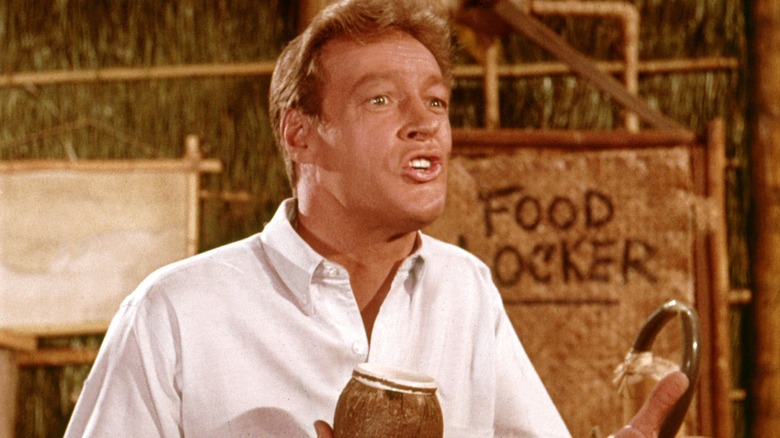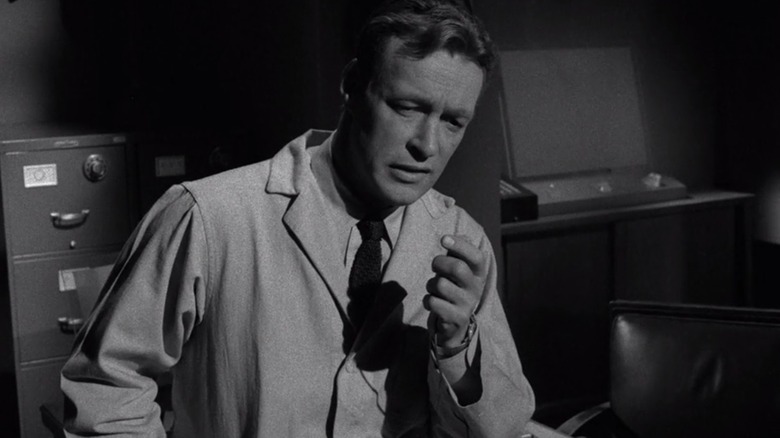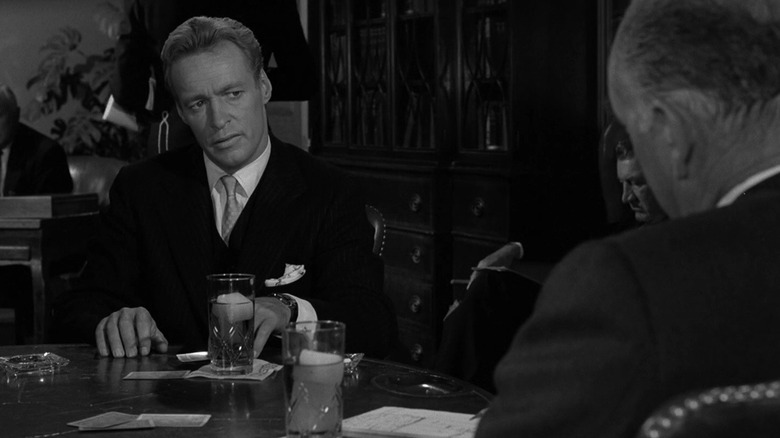The Professor From Gilligan's Island Time Traveled Through The Twilight Zone – Twice
Remember "Gilligan's Island?" Yes, the widely-loved American sitcom that earned massive popularity throughout its 98-episode run and featured an ensemble cast including Bob Denver, Natalie Schafer, Alan Hale Jr., and Russell Johnson. The show took the castaway trope and remolded it as a comedy in which seven castaways attempt to survive on an island after they're shipwrecked, which is further complicated by the shenanigans of the ship's first mate, Gilligan (Denver).
Among this cast of colorful characters is the Professor (Johnson) — the only level-headed person among the castaways, who uses his scientific background to create little devices to make their stay on the island more hospitable. While Johnson perfectly conveyed the subtle comedy inherent in his role (a running gag being his ability to create almost anything using bamboo and coconuts), the actor also embodied serious, dramatic roles in "The Twilight Zone," where he appeared in two separate episodes that involved time travel as a central trope.
These two episodes — "Execution," based on George Clayton Johnson's unpublished novel, and "Back There," written by series creator Rod Serling himself — were unfortunately not on par with the excellence that "The Twilight Zone" is otherwise known for. However, these stories are worth examining on their own, especially within the context of Russell Johnson's character's being directly involved with time travel, and how it impacted the crux of each. Marc Scott Zicree's "The Twilight Zone Companion" provides us with greater insight into where these stories fell short, and how they are different from classic "Twilight Zone" entries such as "Where Is Everybody?" or "Nightmare at 20,000 Feet."
Time travel as retribution
The source material upon which "Execution" is based offers a balanced, scathing take on the concept of justice meted out in a way that defies the space-time continuum. Here, two scientists use a time machine to extricate a killer to the present, moments before he is about to be publicly hanged. The scientists, unaware of the killer's crimes, come to realize that inadvertently saving him was a huge mistake, and a string of events leads to the killer being shot by a policeman in the present. This "death" reverts the killer back to the moment where he is about to be hanged, and justice is meted out, despite being momentarily thwarted by the rules of time travel.
Serling's take on "Execution" is a tad more complicated. Here, the killer is outlaw cowboy Joe Caswell (Albert Salmi), who is yanked out before he is hanged by a scientist named Professor Manion (Johnson). Manion realizes that he has let a killer on the loose, and as he tries to send Caswell back, the latter kills him. Just when Caswell thinks he can walk free, a thief strangles him before being accidentally sent back to the noose meant to hang Caswell. The episode ends with this note: "Justice can span years. Retribution is not subject to a calendar."
The decision to bring about balance by hanging a thief, whose crimes are less serious in comparison to a serial murderer like Caswell's, makes "Execution" a clunky and uneven experience. While there's an attempt to deepen the themes of justified comeuppance, the punishment in question comes off as too severe in comparison to the crimes. Manion's death also poses questions, as he becomes a victim of his own invention when he accidentally saves a murderer without meaning to.
Time travel as a theoretical argument
While "Execution" talks about morality and justice by using time travel as a plot device, "Back There" starts off with an intense theoretical discussion about time travel, with a group of socialites discussing the possibility of altering history by traveling back in time. Engineer Peter Corrigan (Johnson) talks to his colleagues at the posh Potomac Club about this unlikely machine, and just as he is about to walk out, he feels weak. Gathering his courage, he leaves the club to find himself stepping into the past: the streets look different, with gas lamps and horse-drawn carriages, and even his own clothes seem to be from an older era. Baffled, he soon realizes that he has been transported to the date of Abraham Lincoln's assassination.
The episode then portrays Corrigan's frantic attempts to change the past, but he is unsuccessful, and even has a run-in with John Wilkes Booth, who drugs him moments before the assassination. Once Corrigan returns to the present, he realizes that he did change the past, but not in the way he thought he would: his actions allow a police officer to gather unprecedented wealth that is savored by his future generations.
While the premise of "Back There" is interesting, as it uses a conversation as the impetus for actual time travel, the outcome is pretty underwhelming and doesn't quite add anything meaningful to the moral quandaries of time travel. The episode's closing narration underlines this by stating that "the threads of history are woven tightly, and the skein of events cannot be undone, but on the other hand, there are small fragments of tapestry that can be altered."


